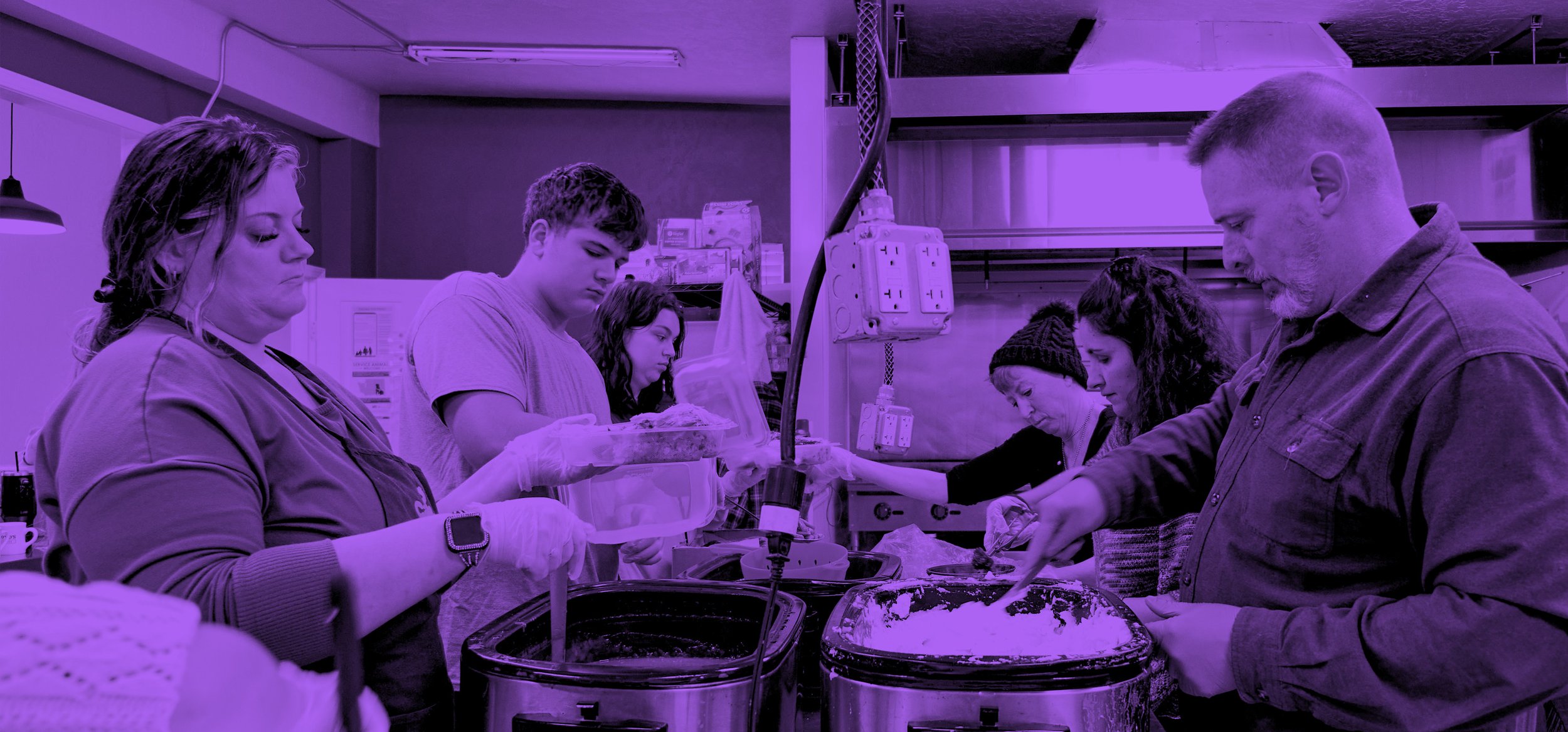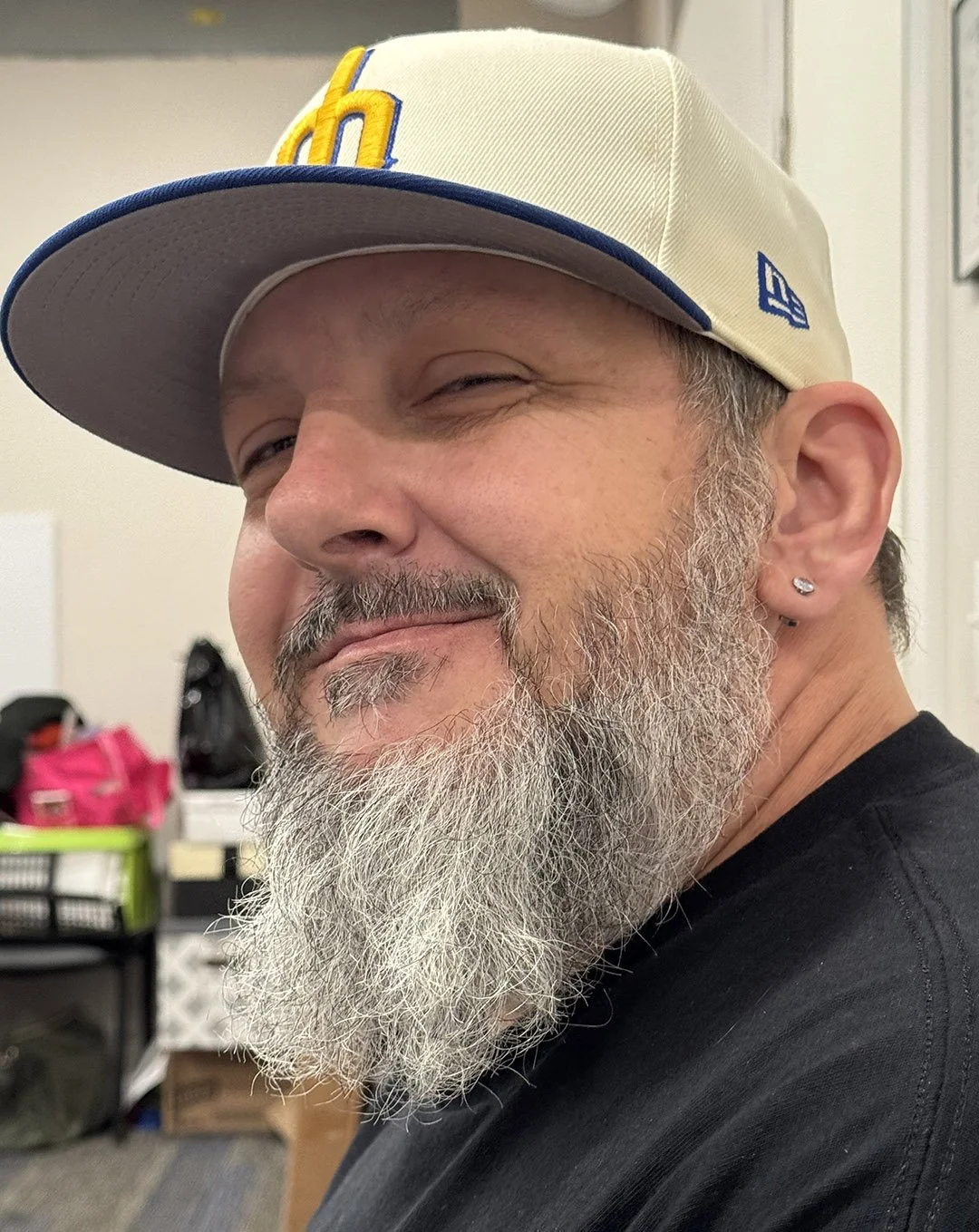
“I just want to live life. It's a beautiful day out and, even though it's a little cold out, you know, I look at things completely different now that I'm clean. Just enjoying the little things, like being able to wake up in a warm bed, able to wash my clothes, not in a river, being able to take a shower every day. Those are just little things, but I'm so grateful for those. I'm grateful to be alive.”
Steve
The People of Gather
Steve F.
Recently, we hired Steve as a Peer Navigator. We’ve known Steve for a few years and couldn’t be more excited to have him at Gather. Here’s a little bit of Steve’s story in his own words…
I was born and raised in Centralia - lived here pretty much all my life, most of my family, too. When I was 17, my cousin was coming home from tutoring somebody at the high school – he’d never done drugs, never had a drop – on his way home and gets in a car wreck and dies. And we did, I mean, everything together. We did everything together. We found out like two weeks after he died that he got a full ride scholarship to go play football at PLU. We were a really close bunch of kids and, you know. I started smoking weed and was drinking a little bit. And, you know, then I started drinking a little bit more and more and smoking quite a bit of weed. But, yeah, that was where things started.
I would have graduated in the class of ‘94. In between my junior and senior year, I dropped out and started working at the Fred Meyer Distribution Center. I was a young guy, and, we were always just partying, and, just doing dumb stuff - didn't have a care in the world. I was making pretty good money for someone who didn't graduate and, so there was a lot of partying, but, ya know nothing too hard.
I got promoted and they shipped me off to Canton, Ohio and I started running a warehouse. Over in Ohio, I calmed down a little bit and I ended up getting married while we were living over there.
So, the warehouse that I was working at, some of the CEOs were embezzling money and, they literally drained everyone's retirement and took off with it. So the warehouse shut down and I tried to find more warehouse work over there, but it was 2004 and people were being laid off left and right everywhere. Ohio was hit pretty hard. So, we made the decision to come back to Washington. Yeah, my addiction started about a year and a half after I got back from Ohio.
We packed up our whole house and moved over there. Things were going really good, and then all of a sudden, you know, the warehouse was shutting down and I tried to find a job but everything was just the minimum wage and I just couldn’t live on a job at like McDonald's or something making six bucks.
So, when I came back, I decided to try a different career to where, maybe, I was in an office a little bit more, because working in warehouse can take a toll on you, your body. I got a job at Rent-A-Center. And then, I was just moving some furniture and I tore my rotator cuff in my right arm, still haven't even got it fixed.
I went to a doctor and they started prescribing pain medicine. They started off with just the hydrocodone. And then it just wasn't, yeah, just wasn't enough. And so they started prescribing me a little bit more. And then they moved on to the little bit stronger, which was oxycodone and they just kept, you know, refilling and refilling and refilling and not doing anything about my arm. At times, I couldn't even lift it. Their thing was physical therapy - like the arm stretches and rubber bands and, you know. But, it was pretty painful.
So, they would just give me more. At first, they started out like, I want to say sixty for a month, which was basically two a day, right? And then they bump me up to ninety and then I think one of the last scripts that I got was two hundred for the month. Yeah, they ended up, that was about the time where the pain clinics came in and they were hurrying everyone to pain clinics. They just flat out pretty much cut everyone off.
I remember going to the doctor, the hospital thinking I was dying and I didn't know why, and they were like, “no, you're going through withdrawals.” I didn't even know what they were talking about because I've never heard really that word. “You don't have any of the drugs in your system, so you're going to feel this sort of way.” They said “well, it's just something you're gonna have to go through.” You know, I felt like I was literally dying. My back hurt, restless legs, cold sweats, you know, vomiting, diarrhea.
I mean, the only way I knew how to stop feeling the way that I was feeling was to get something in me. So, the only way to cure it for me was to go buy some pain pills off the street. That was when the big pill epidemic was going on and all I could do was find them on the streets, and that's when I ran into oxycontins. Eventually, I'm spending my whole paycheck on pills. I really hate to admit it. But, uh, I did some pretty bad things to get a hold of some cash. I would give that money to my wife to pay the bills, with the hope of trying to cut back on the pills a little bit but it just kept being a revolving door, you know, it just wasn't good.
And then, all of a sudden, no one could find any pills… The pills dried up and I'm begging my guy who I was always getting them from and he was like, “I just can't. I can't find them. But, well, you could come over. I have something else that might work for you.” And I'm like, okay, I'm on my way. I didn't even care, you know. And, um, it turned out to be black tar heroin. And I ended up, you know, rapidly needing more and more. I mean, because you're in pain and going through withdrawal. I just could not quit you know, and my whole life just really spiraled out of control. I told my wife I was going to do everything I can to quit again and I tried. I just… I didn't feel right. And, I just could not stop. It was getting worse and worse and worse. And then eventually we separated.
I didn't care about anything, except for getting high. I felt ashamed and so I started distancing myself. Being addicted, just the only thing you care about is not wanting to feel sick and so you'll do anything to get, you know, to feel well. And you're constantly doing that, so it's like a full-time job, you know?
I ended up on the street. I didn’t know what to do.
I was on the street for four years. One night, it was raining hard. So, me and my buddy, we were walking to the shelter for the night, and we were soaking wet. We had heard that there was an open door, busted in, at the college's apartments. So we went in and tried to get warm for the night and soon, the police were busting in. I got arrested and I had a felony warrant in Thurston County.
I gotta do something different. I can't, you know, - I need some accountability. I can’t go up to prison and just come out and just keep repeating the cycle. I knew about drug court. I knew Derek and Troy at Gather had, you know, successfully done drug court.
Being on the streets here in Centralia, I used the services here at Gather. I would come in for lunch. I used the uh the needle exchange. They would come to the homeless camp and not only do a needle exchange, but they would give us like a sack lunch, and if there was anything else that they could help out with, like they would give out socks. That’s how I knew Troy and Derek.
As part of drug court, I have to do 32 hours a week of work. And so what we came up with, since I'm on disability, is doing volunteer time instead. Everybody here has done so much for me and my addiction and just not me, but for the whole community. So, there was no doubt in my mind that I wanted to do the community service here at Gather. Literally, you know, they took me to treatment a couple of times, and even though I ran from treatment, they were constantly feeding me, helped keep me alive by giving me clean needles. I can't, literally, can't thank them enough. And so I chose to work at Gather.
My favorite thing here is interacting with the - I don't know if you'd really call them clients - but, clients. I know quite a few of them from being on the streets and if they can just kind of go, look, Steve’s clean now. He's doing it. Kind of the way I looked at Troy and Derek and kind of gives us hope that people can change their lives. So, helping them out in any way I can - if they just wanted to talk for a minute, or need a snack or a cigarette.
I like every aspect of being clean - getting old childhood friends back. I’m meeting supportive friends that actually care about me and hope I’m doing good and would be there if I needed them. But, mostly, being clean? I found myself again. And, I'm really starting to, you know, like myself and I haven't done that in a long time.
I just want to live life. It's a beautiful day out and, even though it's a little cold out, you know, I look at things completely different now that I'm clean. Just enjoying the little things, like being able to wake up in a warm bed, able to wash my clothes, not in a river, being able to take a shower every day. Those are just little things, but I'm so grateful for those. I'm grateful to be alive.

